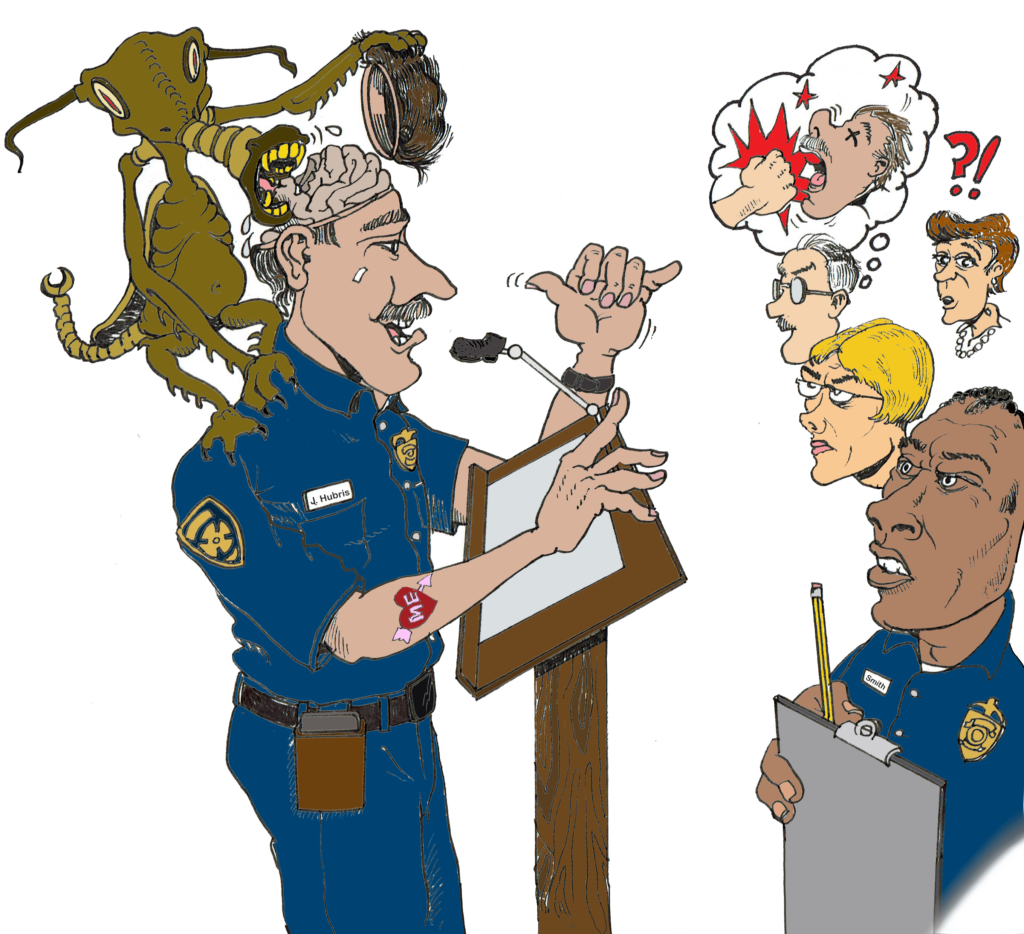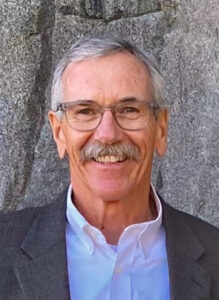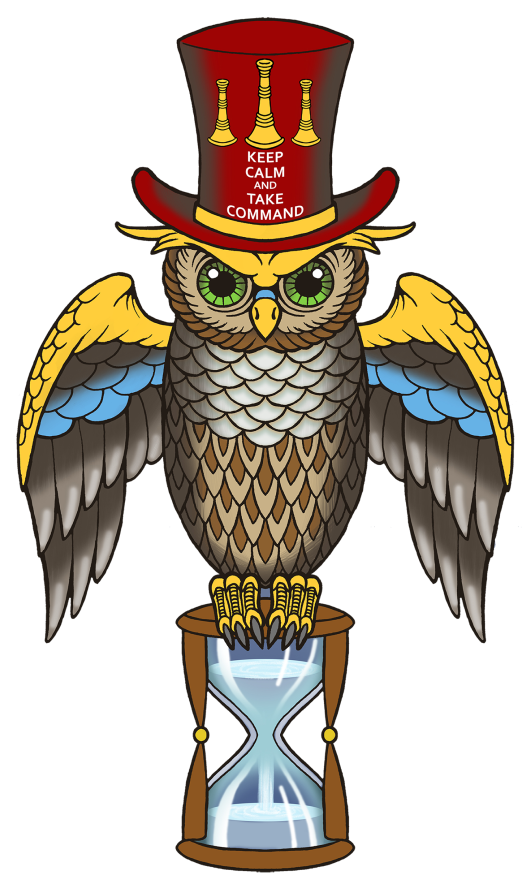Egos Eat Brains—and Sometimes Pizza: Nothing good happens when bosses choose ego-driven pride over compassion, fairness & empathy.
May 26, 2025Egos Eat Brains—and Sometimes Pizza
Nothing good happens when bosses choose ego-driven pride over compassion, fairness & empathy.
By Terry Garrison
B Shifter Buckslip, May 27, 2025
I remember the first time pride hit me right in the face, and I don’t mean figuratively. I mean physically in the form of a very large fist attached to a very large person. It was the first day of my freshman year in high school. I was walking to my first class with my two grade-school buddies when another kid threw a penny at us and yelled, “freshman scum!”
I thought I was pretty cool. I mean, just months earlier, I’d claimed the title of King Runner-Up at the eighth-grade homecoming game, and there was no way I was going to be disrespected by anyone. So I picked up the penny and threw it back at the guy, calling him a big fat so-and-so.
Honestly, I can’t recall exactly how quickly he moved; all I know is that when I turned to run, he caught me within a few steps. How was I to know he was a senior on the football team and all that “fat” was actually pure muscle? Needless to say, he gave me a few punches and called me a few names, which I really couldn’t make out amid the sound of his fists pummeling my head. He must have gotten bored; the beating was over as soon as it had begun, and he casually walked away. He left me with a lesson I still carry today: Don’t let your mouth get you into something your butt (or legs) can’t get you out of. My pride had fueled my ego—which in turn ran my mouth—and got my ass kicked. Lesson learned, right? Not exactly. Our ego can resurface if we’re not careful, especially as we advance in our careers. However, becoming a leader should be a privilege to serve more people, not a license to have more people serve us.

Ego vs. Pride
Don’t get me wrong; pride is not always negative. The adjective form of pride is proud, which describes pride in ourselves and others. We should be proud of many things, like being a firefighter and the satisfaction of a job done well. In fact, pride is best when shared, such as the feeling a crew gets after working together to extinguish a fire or ensuring a trauma patient is delivered to the emergency room with a chance of survival because of our intervention. Pride only becomes a problem when it is fed by our ego, not our work or accomplishments. Ego-fed pride makes us believe we are self-important and better than others.

6 Tips for Keeping Ego in Check
-
Show leadership through support and example, not status or perks.
-
Stay grounded. Don’t fall prey to compliments. You are only as good as the work you do.
-
Clear messages of fairness and respect, like removing reserved parking, demonstrate humility.
-
Treat everyone with respect. Be kind to subordinates and customers, not just superiors or “useful” people. As a leader, your job is to support your team—not the other way around.
-
Don’t assign value based on what others can do for you. Everyone deserves empathy and fair treatment.
- Lead like Bruno. “Don’t disqualify the customer with your qualifications.” Treat others as equals, and always be nice.
Beware the Power Trip Trap
Leaders who suffer from ego-driven pride are common but easy to spot because their actions are self-serving. Most of these bosses implode at some point because they usually think the rules of decorum don’t apply to them. I have known fire chiefs whose egos are so big they can’t get out of their own way. Bruno once said that fire chiefs lose their jobs for two primary reasons: 1) They spend the taxpayers’ money like it’s their own (redecorating their offices is a familiar vise); and 2) They treat their staff and subordinates like property (sometimes even sleeping with them). These examples are all about the delusion of power (aka, delusions of grandeur). It’s not just fire chiefs who suffer from this condition. I have seen firefighters, fire captains, chief officers and politicians use their professional power negatively. Yes, firefighters can have a perceived professional power. I know of one firefighter who wore his uniform on his days off to get a discounted pizza dinner with his entire family. Unsurprisingly, the pizza place stopped giving discounts to all firefighters, on and off duty. Egos eat brains, and this dumbass ate pizza.
Bruno was the most humble person I’ve ever known. In the 30 years I worked with him, I never saw ego affect his brain. I hope that some of that rubbed off on me, but I must confess there were times I needed to check myself. As a fire chief, people often tell you how great you are. Don’t believe it! You are only as good as the work you do, and a leader’s most important job is supporting their workers in a fair, professional and nice way. Don’t play games, and don’t play favorites. We all have favorites, and it’s okay if you don’t make it obvious and discriminate against others.
I surprised one department I led by immediately eliminating the chief officers’ special parking spots—covered spaces right next to the building. I made this decision after watching my administrative aid walk a long distance through the rain on my first day as chief. Removing those reserved spots didn’t seem like a big deal, but it made an instant impression on the entire department. It sent a clear message: Leaders are here to support their members. The first come, first choice parking seemed to make the most sense. (By the way, Bruno never had a special parking spot.)
Ask Not What They Can Do for You
Ego-driven members manage to keep their positions because they treat the people they work for much nicer than the people who work for them. They have two distinct personalities, one that sucks up to their bosses and another that disparage their subordinates. In the book Fire Department Customer Service, Bruno says, “Don’t disqualify the customer with your qualifications.” I think that applies here. Leaders driven by their egos assign everyone a spot on the “what can you do for me?” and “I am better than you” scales and then treat them accordingly. I have even seen firefighters treat customers this way, and it’s just not right. No one should have to qualify for fair and empathetic treatment.
Every firefighter who puts on the uniform and shows up to do their best for the customer has every reason to be proud. Pride turns negative when it’s fueled by ego—when we start to believe we’re special or better than the people we serve. That includes leaders whose job is to serve their firefighters. Treat everyone as if they’re your customer, and you’ll gain more power than you ever thought possible—the power of respect. And that’s something truly worth being proud of.

In 2007, Terry Garrison retired from the Phoenix Fire Department after serving more than 30 years. Working for Alan Brunacini and reaching the rank of assistant chief of operations helped shape Terry’s consistent values: firefighter safety and customer service. After a quick retirement, Terry served as the fire chief of the Oceanside (Calif.) Fire Department for almost three years. He then served as the chief of the Houston Fire Department for more than five years. Terry eventually moved back to where he was raised and served as the fire chief for the Glendale (Ariz.) Fire Department for more than six years before officially retiring from government service. Including his two years in the U.S. Army, Terry has worked for the government and worn a nametag and a helmet for over 47 years. (Thank goodness for helmets.) In addition, he has traveled throughout the world teaching Fire Command, utilizing his master’s degree in education. Today, Terry and his wife, Annette, live in Phoenix. He will continue to stay connected to the fire service by working with B Shifter.



